Early Childhood Education and Care: Adolescent Brain Analysis
VerifiedAdded on 2023/03/20
|8
|2064
|32
Essay
AI Summary
This essay delves into the complexities of the adolescent brain within the context of early childhood education and care. Part A of the essay critiques the myth that the first answer is often the right answer, arguing against the common belief and highlighting the importance of critical thinking and evidence-based analysis. Part B focuses on adolescent brain development, examining peer influence, the biological bases of adolescent behavior including the social-emotional and cognitive control systems, and risk-taking behaviors. The essay provides examples of effective applications of these concepts in an educational setting, such as cooperative learning to address peer relationships and the use of positive reinforcement strategies to boost confidence, alongside value-based education to guide adolescents towards proper direction. All discussions and examples are supported by explicit references to relevant theories and research.
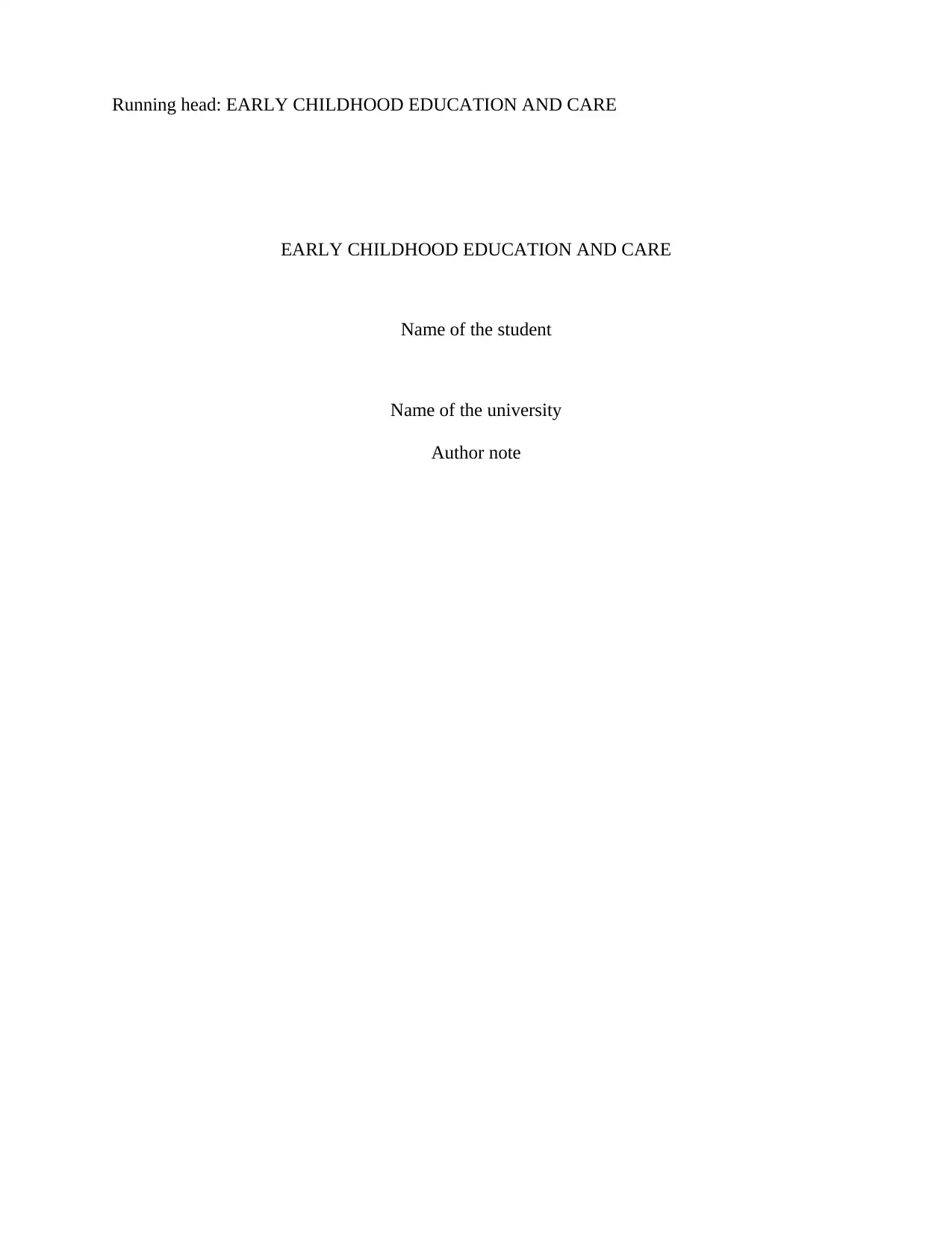
Running head: EARLY CHILDHOOD EDUCATION AND CARE
EARLY CHILDHOOD EDUCATION AND CARE
Name of the student
Name of the university
Author note
EARLY CHILDHOOD EDUCATION AND CARE
Name of the student
Name of the university
Author note
Paraphrase This Document
Need a fresh take? Get an instant paraphrase of this document with our AI Paraphraser
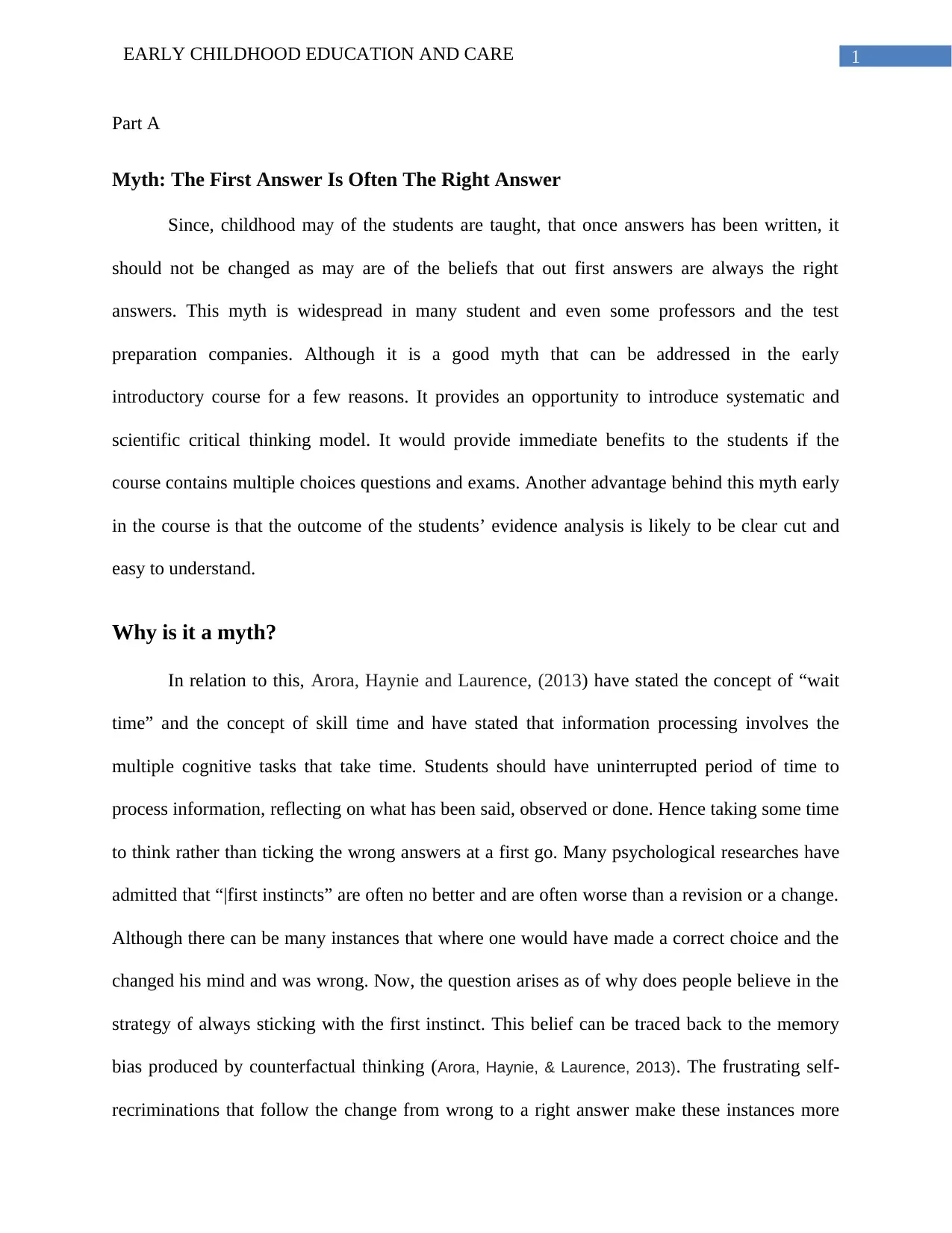
1EARLY CHILDHOOD EDUCATION AND CARE
Part A
Myth: The First Answer Is Often The Right Answer
Since, childhood may of the students are taught, that once answers has been written, it
should not be changed as may are of the beliefs that out first answers are always the right
answers. This myth is widespread in many student and even some professors and the test
preparation companies. Although it is a good myth that can be addressed in the early
introductory course for a few reasons. It provides an opportunity to introduce systematic and
scientific critical thinking model. It would provide immediate benefits to the students if the
course contains multiple choices questions and exams. Another advantage behind this myth early
in the course is that the outcome of the students’ evidence analysis is likely to be clear cut and
easy to understand.
Why is it a myth?
In relation to this, Arora, Haynie and Laurence, (2013) have stated the concept of “wait
time” and the concept of skill time and have stated that information processing involves the
multiple cognitive tasks that take time. Students should have uninterrupted period of time to
process information, reflecting on what has been said, observed or done. Hence taking some time
to think rather than ticking the wrong answers at a first go. Many psychological researches have
admitted that “|first instincts” are often no better and are often worse than a revision or a change.
Although there can be many instances that where one would have made a correct choice and the
changed his mind and was wrong. Now, the question arises as of why does people believe in the
strategy of always sticking with the first instinct. This belief can be traced back to the memory
bias produced by counterfactual thinking (Arora, Haynie, & Laurence, 2013). The frustrating self-
recriminations that follow the change from wrong to a right answer make these instances more
Part A
Myth: The First Answer Is Often The Right Answer
Since, childhood may of the students are taught, that once answers has been written, it
should not be changed as may are of the beliefs that out first answers are always the right
answers. This myth is widespread in many student and even some professors and the test
preparation companies. Although it is a good myth that can be addressed in the early
introductory course for a few reasons. It provides an opportunity to introduce systematic and
scientific critical thinking model. It would provide immediate benefits to the students if the
course contains multiple choices questions and exams. Another advantage behind this myth early
in the course is that the outcome of the students’ evidence analysis is likely to be clear cut and
easy to understand.
Why is it a myth?
In relation to this, Arora, Haynie and Laurence, (2013) have stated the concept of “wait
time” and the concept of skill time and have stated that information processing involves the
multiple cognitive tasks that take time. Students should have uninterrupted period of time to
process information, reflecting on what has been said, observed or done. Hence taking some time
to think rather than ticking the wrong answers at a first go. Many psychological researches have
admitted that “|first instincts” are often no better and are often worse than a revision or a change.
Although there can be many instances that where one would have made a correct choice and the
changed his mind and was wrong. Now, the question arises as of why does people believe in the
strategy of always sticking with the first instinct. This belief can be traced back to the memory
bias produced by counterfactual thinking (Arora, Haynie, & Laurence, 2013). The frustrating self-
recriminations that follow the change from wrong to a right answer make these instances more
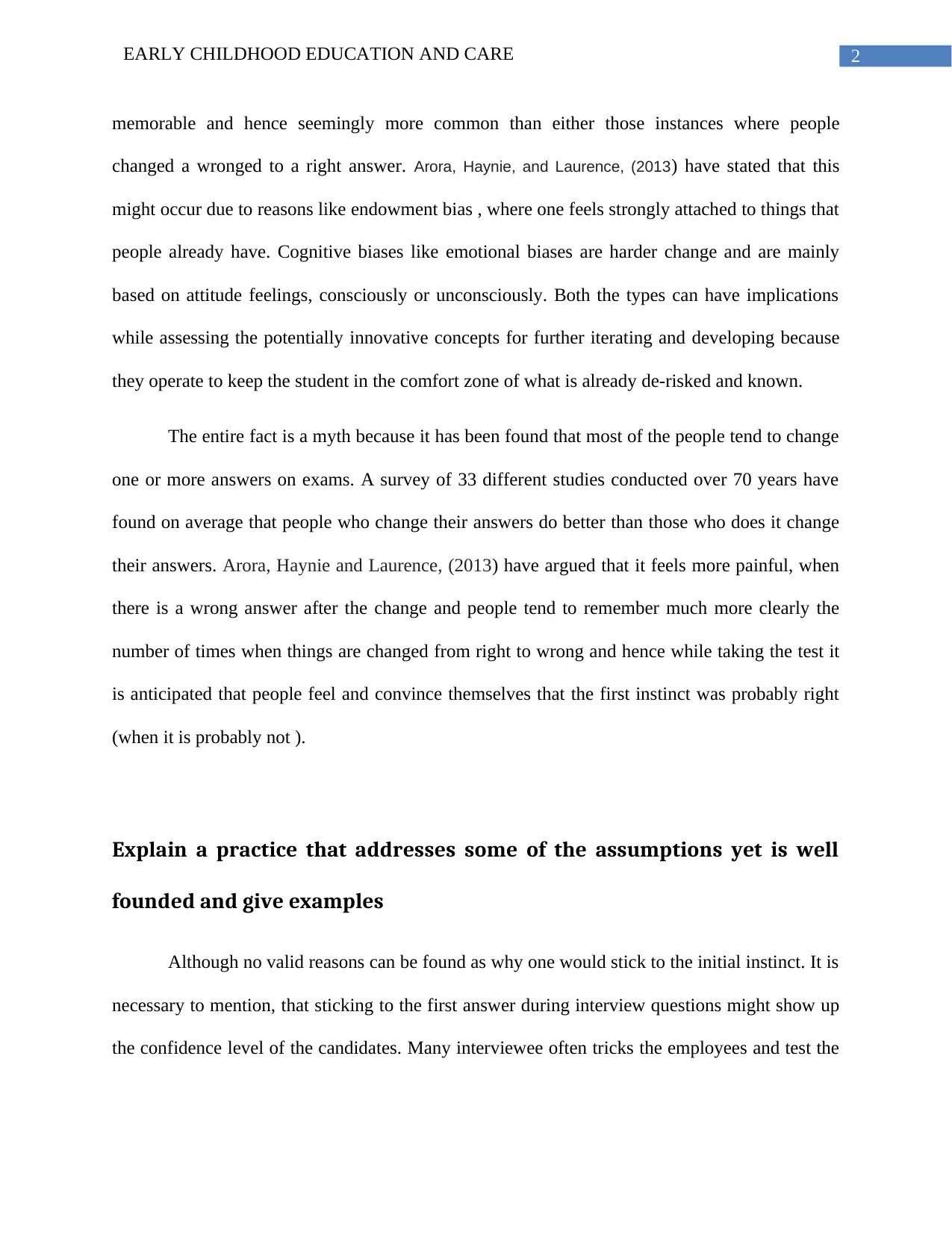
2EARLY CHILDHOOD EDUCATION AND CARE
memorable and hence seemingly more common than either those instances where people
changed a wronged to a right answer. Arora, Haynie, and Laurence, (2013) have stated that this
might occur due to reasons like endowment bias , where one feels strongly attached to things that
people already have. Cognitive biases like emotional biases are harder change and are mainly
based on attitude feelings, consciously or unconsciously. Both the types can have implications
while assessing the potentially innovative concepts for further iterating and developing because
they operate to keep the student in the comfort zone of what is already de-risked and known.
The entire fact is a myth because it has been found that most of the people tend to change
one or more answers on exams. A survey of 33 different studies conducted over 70 years have
found on average that people who change their answers do better than those who does it change
their answers. Arora, Haynie and Laurence, (2013) have argued that it feels more painful, when
there is a wrong answer after the change and people tend to remember much more clearly the
number of times when things are changed from right to wrong and hence while taking the test it
is anticipated that people feel and convince themselves that the first instinct was probably right
(when it is probably not ).
Explain a practice that addresses some of the assumptions yet is well
founded and give examples
Although no valid reasons can be found as why one would stick to the initial instinct. It is
necessary to mention, that sticking to the first answer during interview questions might show up
the confidence level of the candidates. Many interviewee often tricks the employees and test the
memorable and hence seemingly more common than either those instances where people
changed a wronged to a right answer. Arora, Haynie, and Laurence, (2013) have stated that this
might occur due to reasons like endowment bias , where one feels strongly attached to things that
people already have. Cognitive biases like emotional biases are harder change and are mainly
based on attitude feelings, consciously or unconsciously. Both the types can have implications
while assessing the potentially innovative concepts for further iterating and developing because
they operate to keep the student in the comfort zone of what is already de-risked and known.
The entire fact is a myth because it has been found that most of the people tend to change
one or more answers on exams. A survey of 33 different studies conducted over 70 years have
found on average that people who change their answers do better than those who does it change
their answers. Arora, Haynie and Laurence, (2013) have argued that it feels more painful, when
there is a wrong answer after the change and people tend to remember much more clearly the
number of times when things are changed from right to wrong and hence while taking the test it
is anticipated that people feel and convince themselves that the first instinct was probably right
(when it is probably not ).
Explain a practice that addresses some of the assumptions yet is well
founded and give examples
Although no valid reasons can be found as why one would stick to the initial instinct. It is
necessary to mention, that sticking to the first answer during interview questions might show up
the confidence level of the candidates. Many interviewee often tricks the employees and test the
⊘ This is a preview!⊘
Do you want full access?
Subscribe today to unlock all pages.

Trusted by 1+ million students worldwide
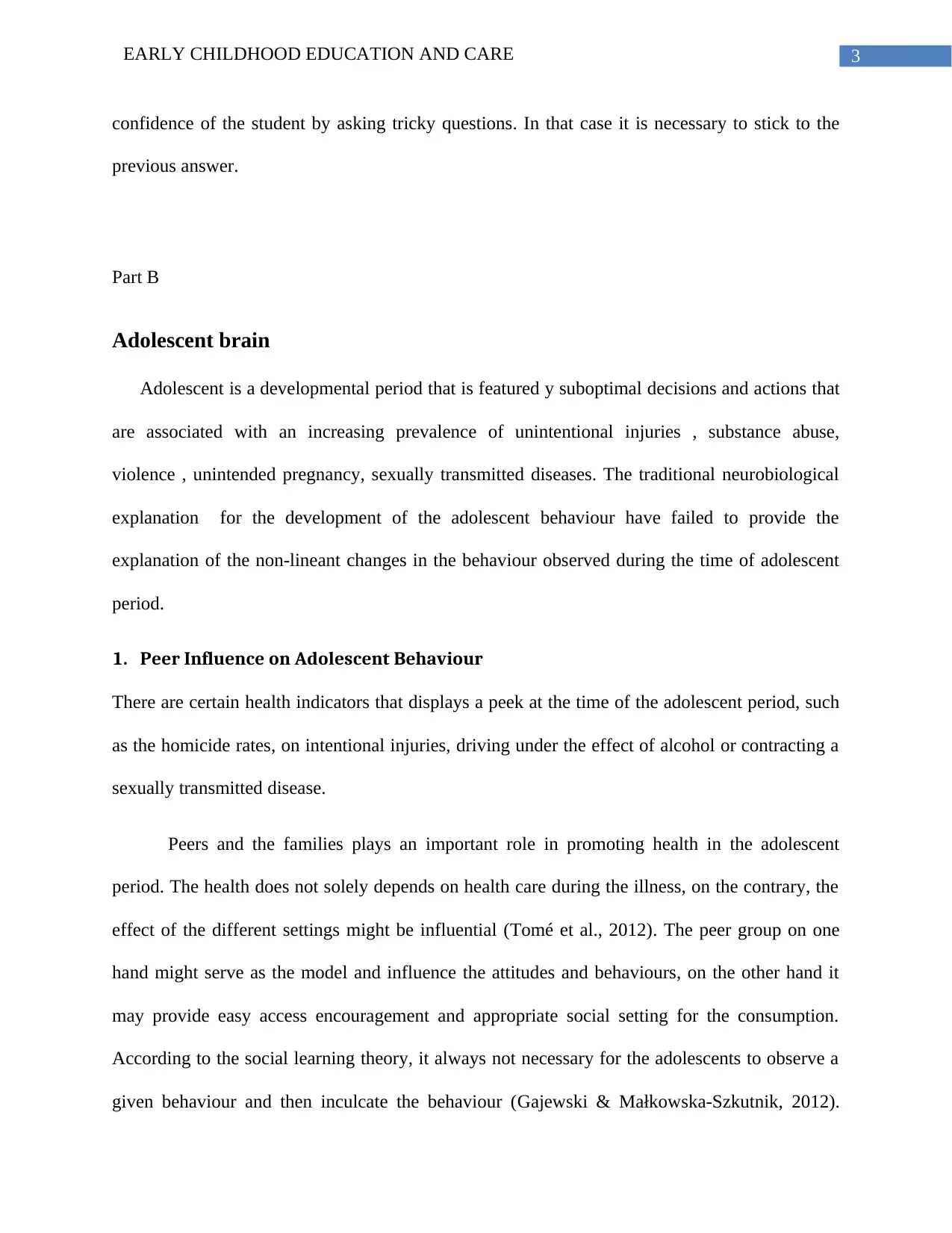
3EARLY CHILDHOOD EDUCATION AND CARE
confidence of the student by asking tricky questions. In that case it is necessary to stick to the
previous answer.
Part B
Adolescent brain
Adolescent is a developmental period that is featured y suboptimal decisions and actions that
are associated with an increasing prevalence of unintentional injuries , substance abuse,
violence , unintended pregnancy, sexually transmitted diseases. The traditional neurobiological
explanation for the development of the adolescent behaviour have failed to provide the
explanation of the non-lineant changes in the behaviour observed during the time of adolescent
period.
1. Peer Influence on Adolescent Behaviour
There are certain health indicators that displays a peek at the time of the adolescent period, such
as the homicide rates, on intentional injuries, driving under the effect of alcohol or contracting a
sexually transmitted disease.
Peers and the families plays an important role in promoting health in the adolescent
period. The health does not solely depends on health care during the illness, on the contrary, the
effect of the different settings might be influential (Tomé et al., 2012). The peer group on one
hand might serve as the model and influence the attitudes and behaviours, on the other hand it
may provide easy access encouragement and appropriate social setting for the consumption.
According to the social learning theory, it always not necessary for the adolescents to observe a
given behaviour and then inculcate the behaviour (Gajewski & Małkowska-Szkutnik, 2012).
confidence of the student by asking tricky questions. In that case it is necessary to stick to the
previous answer.
Part B
Adolescent brain
Adolescent is a developmental period that is featured y suboptimal decisions and actions that
are associated with an increasing prevalence of unintentional injuries , substance abuse,
violence , unintended pregnancy, sexually transmitted diseases. The traditional neurobiological
explanation for the development of the adolescent behaviour have failed to provide the
explanation of the non-lineant changes in the behaviour observed during the time of adolescent
period.
1. Peer Influence on Adolescent Behaviour
There are certain health indicators that displays a peek at the time of the adolescent period, such
as the homicide rates, on intentional injuries, driving under the effect of alcohol or contracting a
sexually transmitted disease.
Peers and the families plays an important role in promoting health in the adolescent
period. The health does not solely depends on health care during the illness, on the contrary, the
effect of the different settings might be influential (Tomé et al., 2012). The peer group on one
hand might serve as the model and influence the attitudes and behaviours, on the other hand it
may provide easy access encouragement and appropriate social setting for the consumption.
According to the social learning theory, it always not necessary for the adolescents to observe a
given behaviour and then inculcate the behaviour (Gajewski & Małkowska-Szkutnik, 2012).
Paraphrase This Document
Need a fresh take? Get an instant paraphrase of this document with our AI Paraphraser
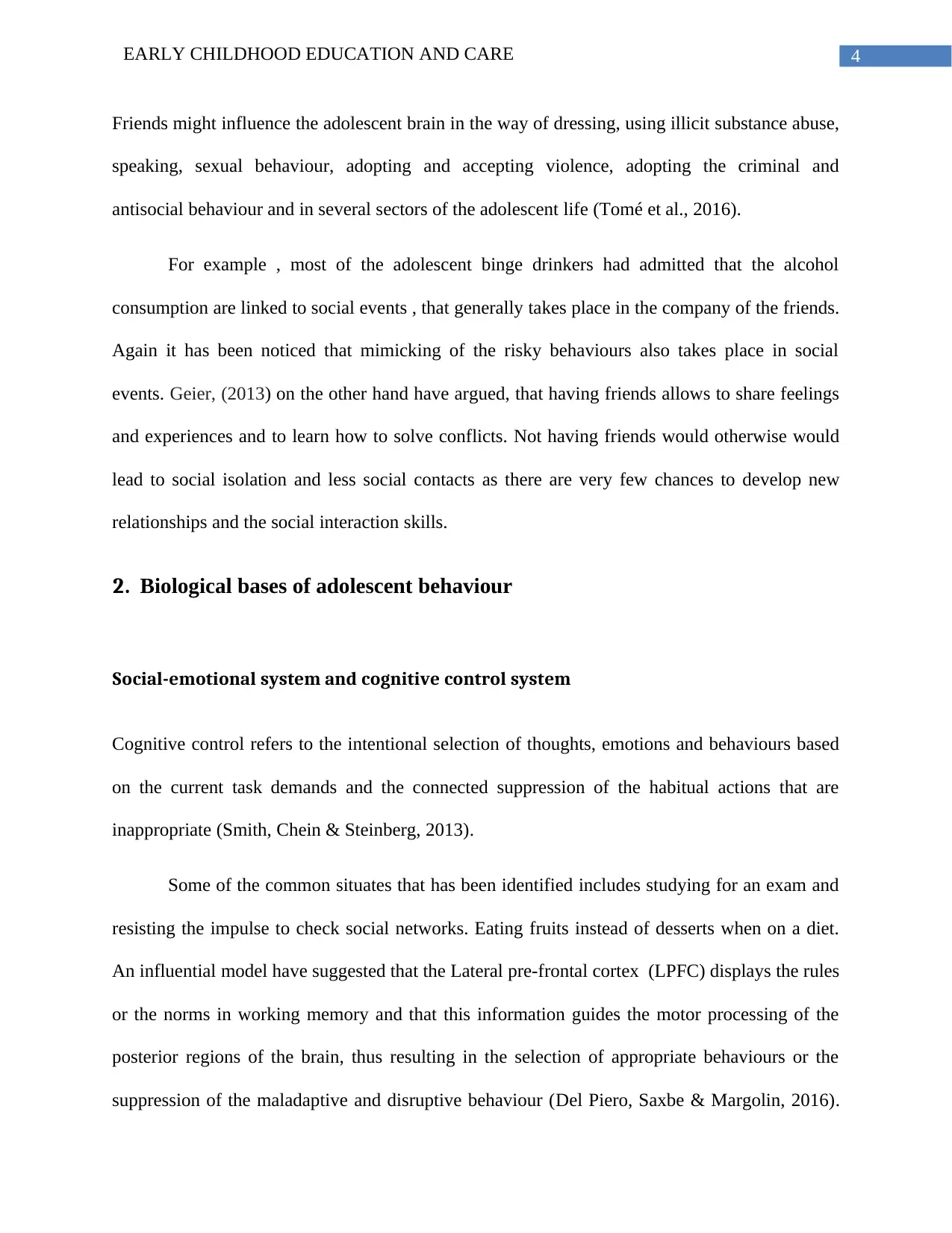
4EARLY CHILDHOOD EDUCATION AND CARE
Friends might influence the adolescent brain in the way of dressing, using illicit substance abuse,
speaking, sexual behaviour, adopting and accepting violence, adopting the criminal and
antisocial behaviour and in several sectors of the adolescent life (Tomé et al., 2016).
For example , most of the adolescent binge drinkers had admitted that the alcohol
consumption are linked to social events , that generally takes place in the company of the friends.
Again it has been noticed that mimicking of the risky behaviours also takes place in social
events. Geier, (2013) on the other hand have argued, that having friends allows to share feelings
and experiences and to learn how to solve conflicts. Not having friends would otherwise would
lead to social isolation and less social contacts as there are very few chances to develop new
relationships and the social interaction skills.
2. Biological bases of adolescent behaviour
Social-emotional system and cognitive control system
Cognitive control refers to the intentional selection of thoughts, emotions and behaviours based
on the current task demands and the connected suppression of the habitual actions that are
inappropriate (Smith, Chein & Steinberg, 2013).
Some of the common situates that has been identified includes studying for an exam and
resisting the impulse to check social networks. Eating fruits instead of desserts when on a diet.
An influential model have suggested that the Lateral pre-frontal cortex (LPFC) displays the rules
or the norms in working memory and that this information guides the motor processing of the
posterior regions of the brain, thus resulting in the selection of appropriate behaviours or the
suppression of the maladaptive and disruptive behaviour (Del Piero, Saxbe & Margolin, 2016).
Friends might influence the adolescent brain in the way of dressing, using illicit substance abuse,
speaking, sexual behaviour, adopting and accepting violence, adopting the criminal and
antisocial behaviour and in several sectors of the adolescent life (Tomé et al., 2016).
For example , most of the adolescent binge drinkers had admitted that the alcohol
consumption are linked to social events , that generally takes place in the company of the friends.
Again it has been noticed that mimicking of the risky behaviours also takes place in social
events. Geier, (2013) on the other hand have argued, that having friends allows to share feelings
and experiences and to learn how to solve conflicts. Not having friends would otherwise would
lead to social isolation and less social contacts as there are very few chances to develop new
relationships and the social interaction skills.
2. Biological bases of adolescent behaviour
Social-emotional system and cognitive control system
Cognitive control refers to the intentional selection of thoughts, emotions and behaviours based
on the current task demands and the connected suppression of the habitual actions that are
inappropriate (Smith, Chein & Steinberg, 2013).
Some of the common situates that has been identified includes studying for an exam and
resisting the impulse to check social networks. Eating fruits instead of desserts when on a diet.
An influential model have suggested that the Lateral pre-frontal cortex (LPFC) displays the rules
or the norms in working memory and that this information guides the motor processing of the
posterior regions of the brain, thus resulting in the selection of appropriate behaviours or the
suppression of the maladaptive and disruptive behaviour (Del Piero, Saxbe & Margolin, 2016).
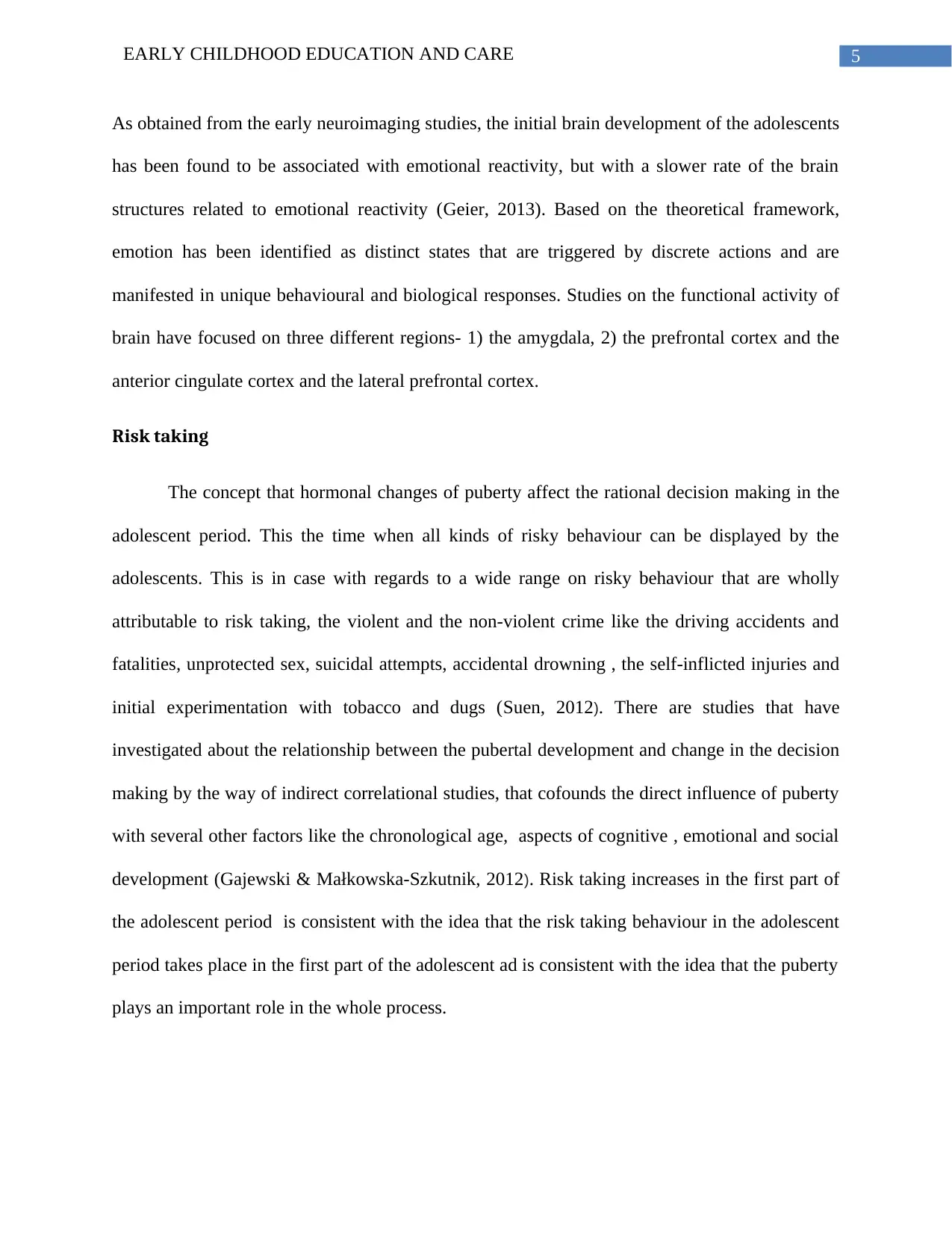
5EARLY CHILDHOOD EDUCATION AND CARE
As obtained from the early neuroimaging studies, the initial brain development of the adolescents
has been found to be associated with emotional reactivity, but with a slower rate of the brain
structures related to emotional reactivity (Geier, 2013). Based on the theoretical framework,
emotion has been identified as distinct states that are triggered by discrete actions and are
manifested in unique behavioural and biological responses. Studies on the functional activity of
brain have focused on three different regions- 1) the amygdala, 2) the prefrontal cortex and the
anterior cingulate cortex and the lateral prefrontal cortex.
Risk taking
The concept that hormonal changes of puberty affect the rational decision making in the
adolescent period. This the time when all kinds of risky behaviour can be displayed by the
adolescents. This is in case with regards to a wide range on risky behaviour that are wholly
attributable to risk taking, the violent and the non-violent crime like the driving accidents and
fatalities, unprotected sex, suicidal attempts, accidental drowning , the self-inflicted injuries and
initial experimentation with tobacco and dugs (Suen, 2012). There are studies that have
investigated about the relationship between the pubertal development and change in the decision
making by the way of indirect correlational studies, that cofounds the direct influence of puberty
with several other factors like the chronological age, aspects of cognitive , emotional and social
development (Gajewski & Małkowska-Szkutnik, 2012). Risk taking increases in the first part of
the adolescent period is consistent with the idea that the risk taking behaviour in the adolescent
period takes place in the first part of the adolescent ad is consistent with the idea that the puberty
plays an important role in the whole process.
As obtained from the early neuroimaging studies, the initial brain development of the adolescents
has been found to be associated with emotional reactivity, but with a slower rate of the brain
structures related to emotional reactivity (Geier, 2013). Based on the theoretical framework,
emotion has been identified as distinct states that are triggered by discrete actions and are
manifested in unique behavioural and biological responses. Studies on the functional activity of
brain have focused on three different regions- 1) the amygdala, 2) the prefrontal cortex and the
anterior cingulate cortex and the lateral prefrontal cortex.
Risk taking
The concept that hormonal changes of puberty affect the rational decision making in the
adolescent period. This the time when all kinds of risky behaviour can be displayed by the
adolescents. This is in case with regards to a wide range on risky behaviour that are wholly
attributable to risk taking, the violent and the non-violent crime like the driving accidents and
fatalities, unprotected sex, suicidal attempts, accidental drowning , the self-inflicted injuries and
initial experimentation with tobacco and dugs (Suen, 2012). There are studies that have
investigated about the relationship between the pubertal development and change in the decision
making by the way of indirect correlational studies, that cofounds the direct influence of puberty
with several other factors like the chronological age, aspects of cognitive , emotional and social
development (Gajewski & Małkowska-Szkutnik, 2012). Risk taking increases in the first part of
the adolescent period is consistent with the idea that the risk taking behaviour in the adolescent
period takes place in the first part of the adolescent ad is consistent with the idea that the puberty
plays an important role in the whole process.
⊘ This is a preview!⊘
Do you want full access?
Subscribe today to unlock all pages.

Trusted by 1+ million students worldwide
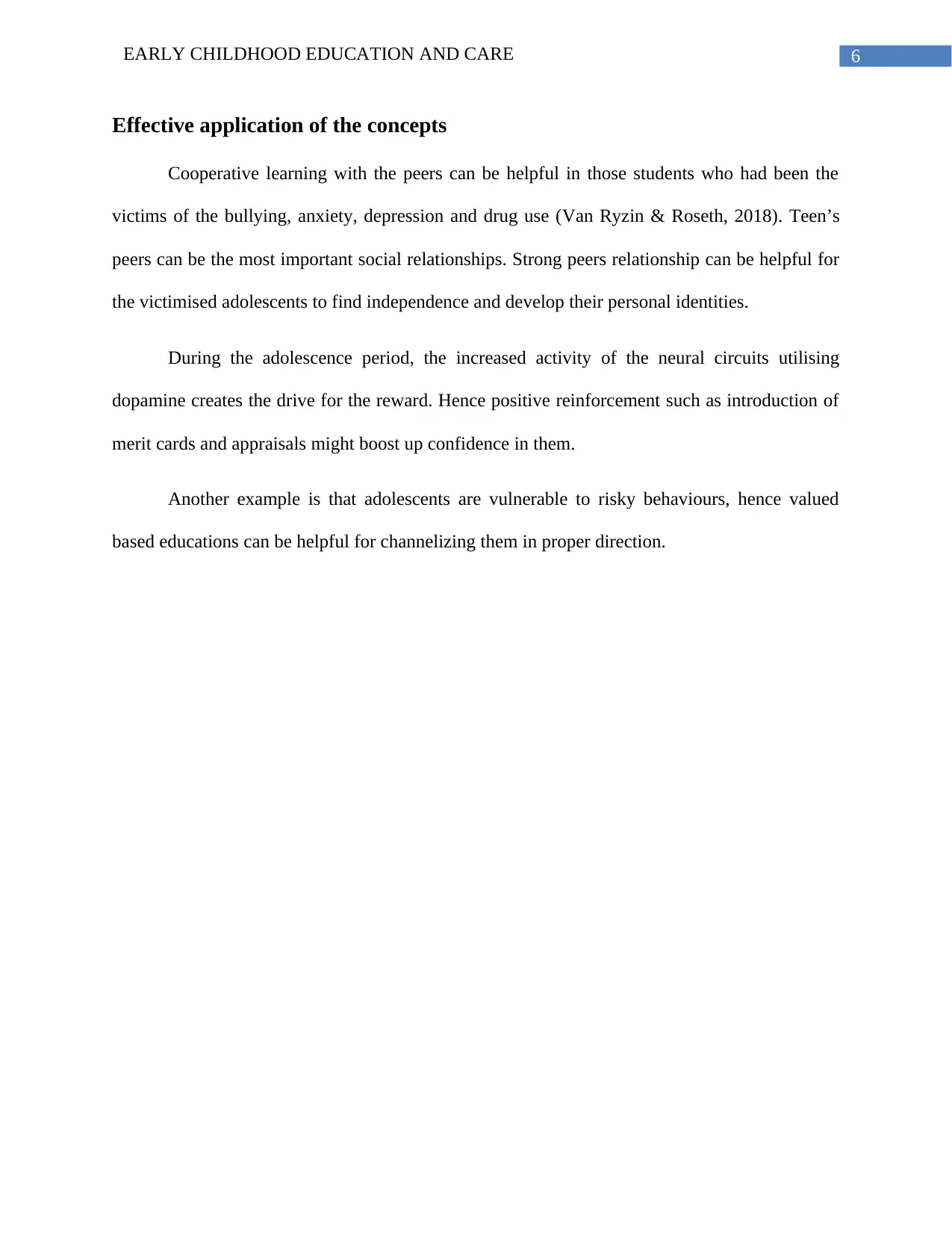
6EARLY CHILDHOOD EDUCATION AND CARE
Effective application of the concepts
Cooperative learning with the peers can be helpful in those students who had been the
victims of the bullying, anxiety, depression and drug use (Van Ryzin & Roseth, 2018). Teen’s
peers can be the most important social relationships. Strong peers relationship can be helpful for
the victimised adolescents to find independence and develop their personal identities.
During the adolescence period, the increased activity of the neural circuits utilising
dopamine creates the drive for the reward. Hence positive reinforcement such as introduction of
merit cards and appraisals might boost up confidence in them.
Another example is that adolescents are vulnerable to risky behaviours, hence valued
based educations can be helpful for channelizing them in proper direction.
Effective application of the concepts
Cooperative learning with the peers can be helpful in those students who had been the
victims of the bullying, anxiety, depression and drug use (Van Ryzin & Roseth, 2018). Teen’s
peers can be the most important social relationships. Strong peers relationship can be helpful for
the victimised adolescents to find independence and develop their personal identities.
During the adolescence period, the increased activity of the neural circuits utilising
dopamine creates the drive for the reward. Hence positive reinforcement such as introduction of
merit cards and appraisals might boost up confidence in them.
Another example is that adolescents are vulnerable to risky behaviours, hence valued
based educations can be helpful for channelizing them in proper direction.
Paraphrase This Document
Need a fresh take? Get an instant paraphrase of this document with our AI Paraphraser
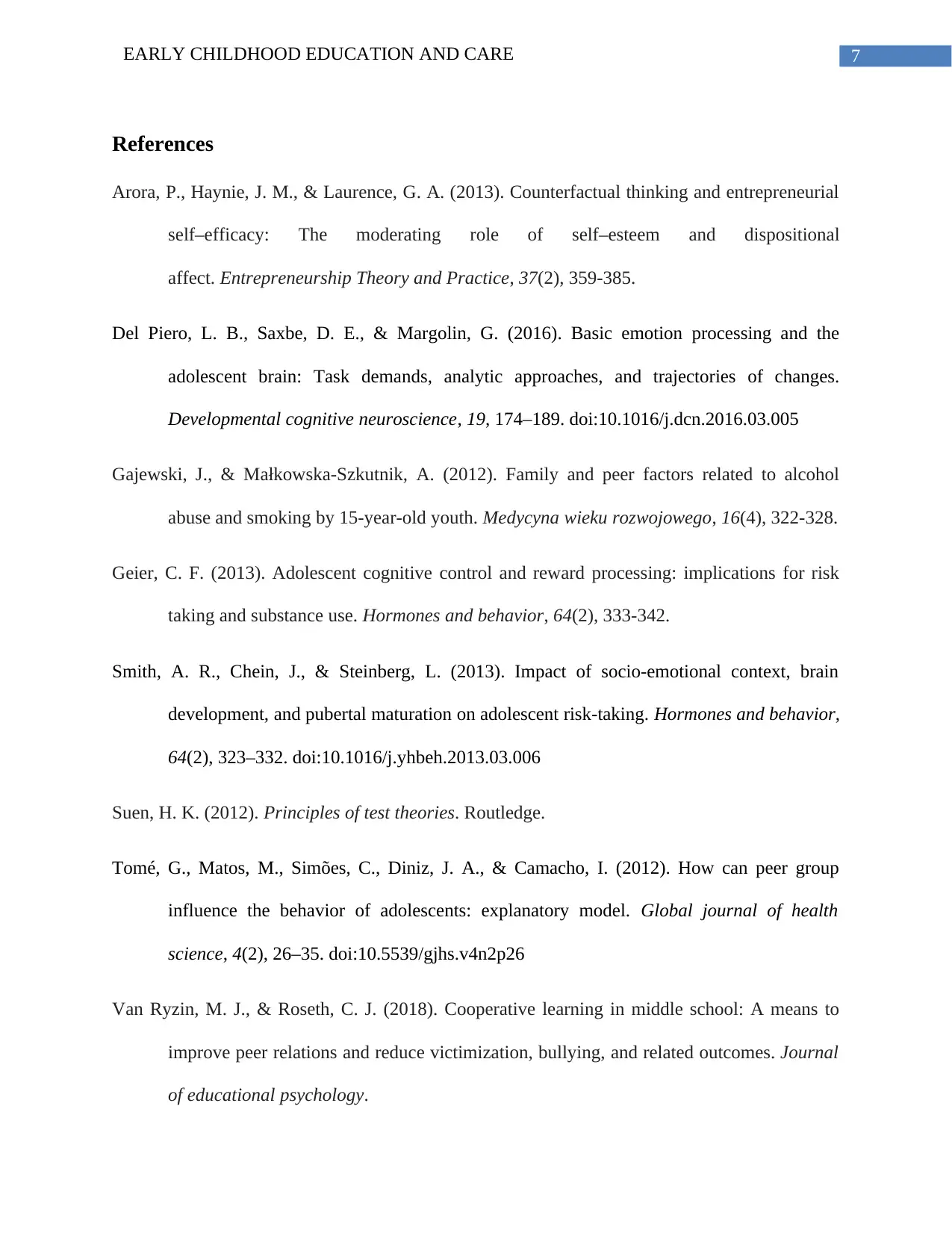
7EARLY CHILDHOOD EDUCATION AND CARE
References
Arora, P., Haynie, J. M., & Laurence, G. A. (2013). Counterfactual thinking and entrepreneurial
self–efficacy: The moderating role of self–esteem and dispositional
affect. Entrepreneurship Theory and Practice, 37(2), 359-385.
Del Piero, L. B., Saxbe, D. E., & Margolin, G. (2016). Basic emotion processing and the
adolescent brain: Task demands, analytic approaches, and trajectories of changes.
Developmental cognitive neuroscience, 19, 174–189. doi:10.1016/j.dcn.2016.03.005
Gajewski, J., & Małkowska-Szkutnik, A. (2012). Family and peer factors related to alcohol
abuse and smoking by 15-year-old youth. Medycyna wieku rozwojowego, 16(4), 322-328.
Geier, C. F. (2013). Adolescent cognitive control and reward processing: implications for risk
taking and substance use. Hormones and behavior, 64(2), 333-342.
Smith, A. R., Chein, J., & Steinberg, L. (2013). Impact of socio-emotional context, brain
development, and pubertal maturation on adolescent risk-taking. Hormones and behavior,
64(2), 323–332. doi:10.1016/j.yhbeh.2013.03.006
Suen, H. K. (2012). Principles of test theories. Routledge.
Tomé, G., Matos, M., Simões, C., Diniz, J. A., & Camacho, I. (2012). How can peer group
influence the behavior of adolescents: explanatory model. Global journal of health
science, 4(2), 26–35. doi:10.5539/gjhs.v4n2p26
Van Ryzin, M. J., & Roseth, C. J. (2018). Cooperative learning in middle school: A means to
improve peer relations and reduce victimization, bullying, and related outcomes. Journal
of educational psychology.
References
Arora, P., Haynie, J. M., & Laurence, G. A. (2013). Counterfactual thinking and entrepreneurial
self–efficacy: The moderating role of self–esteem and dispositional
affect. Entrepreneurship Theory and Practice, 37(2), 359-385.
Del Piero, L. B., Saxbe, D. E., & Margolin, G. (2016). Basic emotion processing and the
adolescent brain: Task demands, analytic approaches, and trajectories of changes.
Developmental cognitive neuroscience, 19, 174–189. doi:10.1016/j.dcn.2016.03.005
Gajewski, J., & Małkowska-Szkutnik, A. (2012). Family and peer factors related to alcohol
abuse and smoking by 15-year-old youth. Medycyna wieku rozwojowego, 16(4), 322-328.
Geier, C. F. (2013). Adolescent cognitive control and reward processing: implications for risk
taking and substance use. Hormones and behavior, 64(2), 333-342.
Smith, A. R., Chein, J., & Steinberg, L. (2013). Impact of socio-emotional context, brain
development, and pubertal maturation on adolescent risk-taking. Hormones and behavior,
64(2), 323–332. doi:10.1016/j.yhbeh.2013.03.006
Suen, H. K. (2012). Principles of test theories. Routledge.
Tomé, G., Matos, M., Simões, C., Diniz, J. A., & Camacho, I. (2012). How can peer group
influence the behavior of adolescents: explanatory model. Global journal of health
science, 4(2), 26–35. doi:10.5539/gjhs.v4n2p26
Van Ryzin, M. J., & Roseth, C. J. (2018). Cooperative learning in middle school: A means to
improve peer relations and reduce victimization, bullying, and related outcomes. Journal
of educational psychology.
1 out of 8
Related Documents
Your All-in-One AI-Powered Toolkit for Academic Success.
+13062052269
info@desklib.com
Available 24*7 on WhatsApp / Email
![[object Object]](/_next/static/media/star-bottom.7253800d.svg)
Unlock your academic potential
Copyright © 2020–2026 A2Z Services. All Rights Reserved. Developed and managed by ZUCOL.





